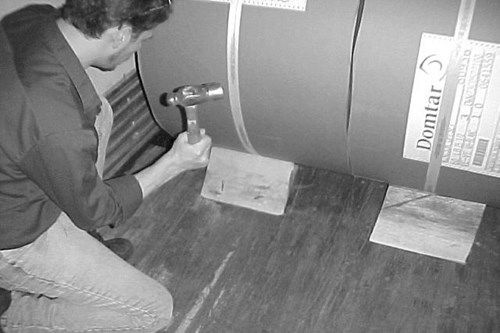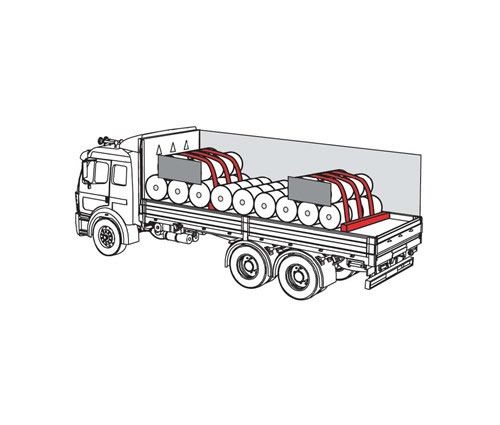Note: Your are not logged in. We can not keep your scores or track your progress unless you Register and Log In
Special Circumstances: Loading and Securing Paper Rolls with Eyes Horizontal
Requirements for eyes crosswise: prevent forward and rearward movement
To prevent paper rolls from rolling or shifting in the forward and rearward directions:
- Either position the rolls in contact with the vehicle structure or other cargo.
- Or use chocks, wedges, tie-downs, blocking, and bracing.
Note: Chocks, wedges or blocking used to secure intermediate rolls from forward or rearward movement during loading do not have to be secured in place

Note: Chocks, Wedges, or Blocking Securing the Front or Rear Roll - Hold in place by some means in addition to friction so they cannot become unintentionally unfastened or loose while the vehicle is in transit. This is often accomplished with nails.
Requirements for eyes crosswise: secure rearmost roll
Do not secure the rearmost roll with:
- Either the rear doors of the vehicle or intermodal container
- Or blocking held in place by those doors.
The doors are not designed or intended as a cargo securing device. The rolls may push the doors open during transit or onto loading dock personnel when the doors are opened.
Requirements for eyes crosswise: prevent rolls from shifting toward either wall
If there is more than a total of 203 mm (8 in) of space between the ends of a paper roll and other rolls or the walls of the vehicle, use one of these methods:
- Void fillers (such as honeycomb)
- Blocking
- Bracing
- Friction mats
- Tie-downs
Requirements for eyes crosswise: secure stacks of paper rolls from front-to-back movement
- Do not load paper rolls on a second layer unless the bottom layer extends to the front of the vehicle.
- Load paper rolls on higher layers only if all wells in the layer beneath are filled.
-
Secure the foremost roll in each upper layer (or any roll with an empty well in front of it) against forward movement:
- Either by placing it in a well formed by two rolls on the lower row whose diameter is equal to or greater than that of the roll on the upper row.
- Or by banding it to other rolls.
- Or by blocking it against an eye-vertical blocking roll resting on the floor of the vehicle that is at least 1.5 times taller than the diameter of the roll being blocked.

If the rearmost roll in each upper layer is located in either of the last two wells formed by the rearmost rolls in the layer below, band it to the other rolls.
No paper rolls in second layer unless bottom layer extends to front of vehicle
Requirements for eyes crosswise: prevent stacked rolls from shifting toward either wall
If there is more than a total of 203 mm (8 in) of space between the ends of a paper roll and other rolls or the walls of the vehicle, use one of these methods.
- Void fillers (such as honeycomb)
- Blocking
- Bracing
- Friction mats
- Tie-downs
These are the same requirements that are used to secure a single layer of paper rolls.
Multiple-Choice Questions:
When loading paper rolls with eyes horizontal, which of the following is not a requirement for stacking a second layer:
- The bottom layer must extend all the way to the front.
- Place second layer with eyes vertical.
- All the wells in the layer beneath must be filled
- It must be blocked against an eye-vertical blocking roll resting on the floor of the vehicle that is at least 1.5 times taller than the diameter of the roll being blocked.
Requirements for eyes crosswise: secure stacks of paper rolls from front-to-back movement
- Do not load paper rolls on a second layer unless the bottom layer extends to the front of the vehicle.
- Load paper rolls on higher layers only if all wells in the layer beneath are filled.
-
Secure the foremost roll in each upper layer (or any roll with an empty well in front of it) against forward movement:
- Either by placing it in a well formed by two rolls on the lower row whose diameter is equal to or greater than that of the roll on the upper row.
- Or by banding it to other rolls.
- Or by blocking it against an eye-vertical blocking roll resting on the floor of the vehicle that is at least 1.5 times taller than the diameter of the roll being blocked.
When securing paper rolls with eyes crosswise, which of the following can be used to prevent side-to-side shifting when there is more than 8 inches of space to the wall?
- Tiedowns.
- Friction mats.
- Void fillers.
- Any of these methods are acceptable.
Requirements for eyes crosswise: prevent rolls from shifting toward either wall
If there is more than a total of 203 mm (8 in) of space between the ends of a paper roll and other rolls or the walls of the vehicle, use one of these methods:
- Void fillers (such as honeycomb)
- Blocking
- Bracing
- Friction mats
- Tiedowns
When securing paper rolls with eyes horizontal, which of the following should be used to secure the rear-most roll?
- Wedges or chocks secured by some means in addition to friction.
- Secure roll against rear doors.
- Secure blocking against rear doors.
- All of these are acceptable

Note: Chocks, Wedges, or Blocking Securing the Front or Rear Roll - Hold in place by some means in addition to friction so they cannot become unintentionally unfastened or loose while the vehicle is in transit. This is often accomplished with nails.
Requirements for eyes crosswise: secure rearmost roll
Do not secure the rearmost roll with:
- Either the rear doors of the vehicle or intermodal container
- Or blocking held in place by those doors.
Complete!
You can Return To The Table Of Contents







 TT On Facebook
TT On Facebook